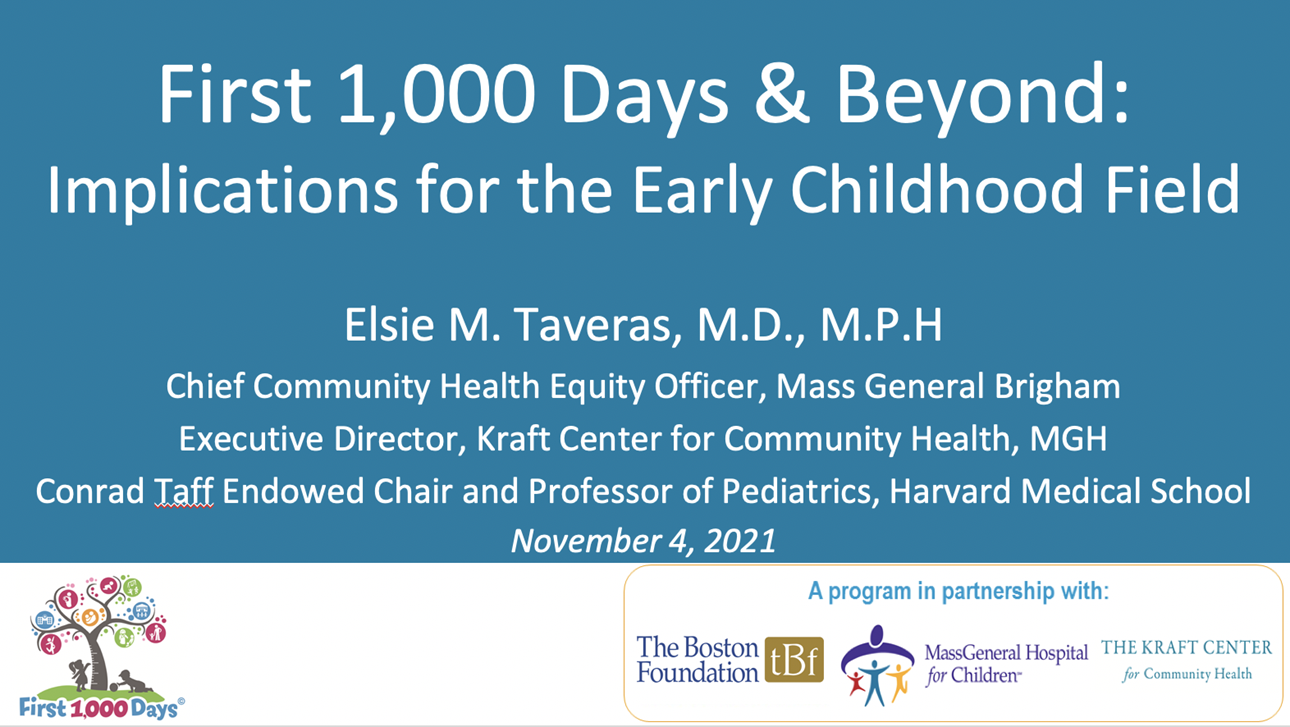First 1,000 Days Forum
November 4, 2021
If you live to be 100, you’ll see 36,525 days. But the first 1,000 days of your development, which start even before you are born, have outsize importance in shaping all those that follow. That’s what researchers are increasingly finding, and it’s the premise that was turned into action with the community health partnership called the First 1,000 Days Program, launched approximately 2,191 days (six years) ago, to coordinate care and improve prenatal and infant health.
At a virtual forum hosted by the Boston Foundation on November 4, Mass General Brigham Chief Community Health Equity Officer Elsie Tavares shared findings from an assessment of the First 1,000 Days program. On several fronts she called the team “incredibly pleased” with the results.
With a baseline where almost one in five children are estimated to have obesity and projections indicate that 59 percent of today’s 2-year-olds will have obesity by the time they are 35, the situation called for deeper questions and new approaches. Why, for instance, do rates of childhood obesity vary by race and why does it kick in so early? How can we interrupt the cycle so the problems don’t persist into adulthood?
The program focused on five approaches to try to reverse these overweight and obesity trends so closely associated with chronic diseases like type 2 diabetes and heart disease.
- Universal screening
- Training clinicians to promote health and disease prevention
- Enhanced tracking
- Patient support
- Individualized health coaching
In all of these areas, adjustments were directed not just at patients but at the social and medical systems in place (or needed) to support them. Close to 900 women and 131 partners participated from their first prenatal checkup, with 700 continuing after the birth of their child. While very effective at helping mothers and infants avoid excess weight gain, it also helped the whole family improve diet and activity levels and reduce anxiety. With services delivered through local, trusted entities it was feasible and acceptable for families. It also highlighted areas of unmet social needs, especially for father - key family partners who are not often enough included in pregnancy and post-partum related initiatives. The First 1,000 Days section of the Mass General Brigham website has more details on the program.
Following Tavares’ overview of the program assessment, a panel of professionals engaged in the work of the First 1,000 Days Program (see names and full titles in sidebar) shared their perspectives. Dr. Renee Boynton-Jarrett’s enthusiasm was palpable: “We’ve gotten a glimpse of what it means to truly reimagine health care. And reimagine it in a way that incorporates perspectives and wisdom that aren’t often heard.” Others concurred: Involving community members and contributors at all levels of health care and social organizations in designing programs will lead to more effective solutions and better outcomes.
Boynton-Jarrett continued, “Collaboration matters! Aligned partners who are thoughtful and intentional working together is key. What I found so exciting is the ability to target both individual and systems-level change. Too often programs only do the former without asking what systems can do differently in a fundamental way. For instance, for too long we haven’t coordinated child’s health with caregiver’s health.”
Sarita Rogers saw inclusion play out in added benefits that strengthen the overall effort. “When families meet through the program it helps sustain the intervention. They can participate in healthy habits together, connected within and across the community,” she said. “So another way we can work as partners is encouraging families to connect with one another.” Maria Yolanda Parra also talked about what the work with families looked like and the importance of building that community village. “Our priority is to really listen carefully to be able to empower and help families set goals they want for themselves and their children. For example, in [Chelsea’s] Healthy Steps Program, parents of babies age 0 to 3 meet. They listen and feel able to share in an environment that’s nonjudgmental. What are their concerns? What community resources will help? Trust is the thread that builds the safety net that all families need. And it creates the village… no family can do it alone.”
Tavares is now thinking about how to address issues clarified by the five-year effort, and “looking for ways not just to scale programs like our own but helping community partners do the same. Nationally, we are interested in how we can use the reach of the First 1000 Days Program results or program model to influence policy.”
As Boston Foundation President and CEO M. Lee Pelton said in opening the forum: “The First 1,000 Days Program is a powerful example of what can happen when we make it a collective priority to improve lives, strengthen communities and advance the greater good.”

